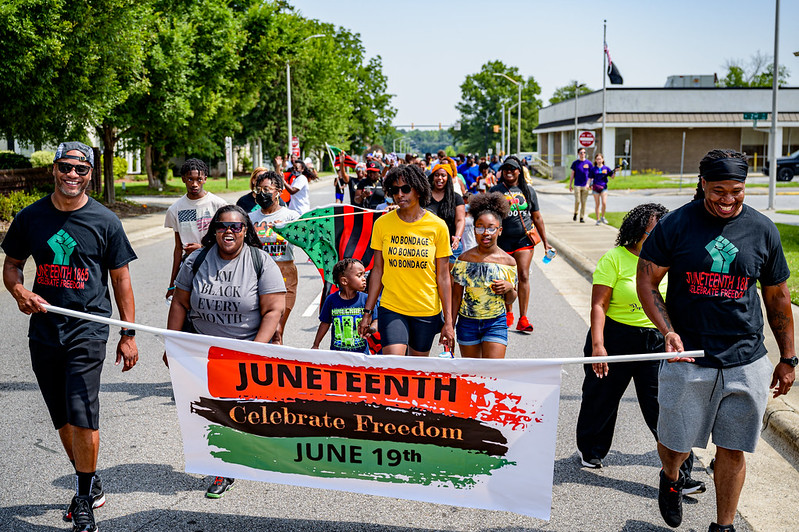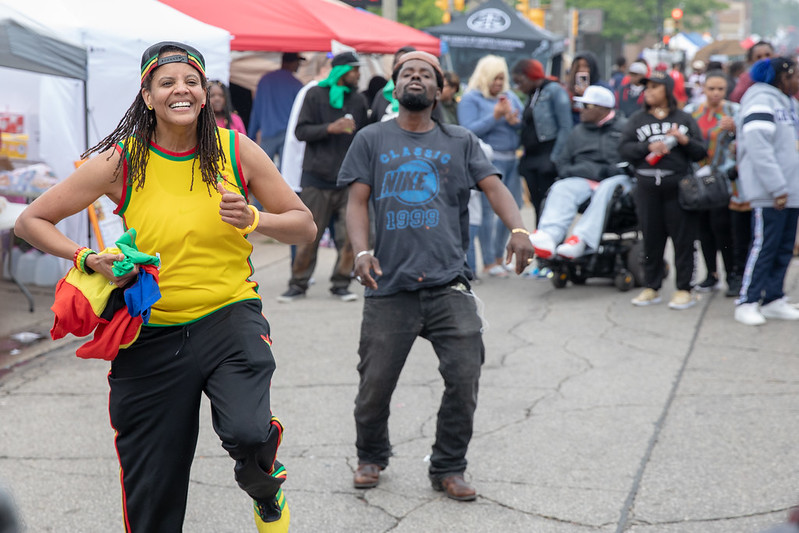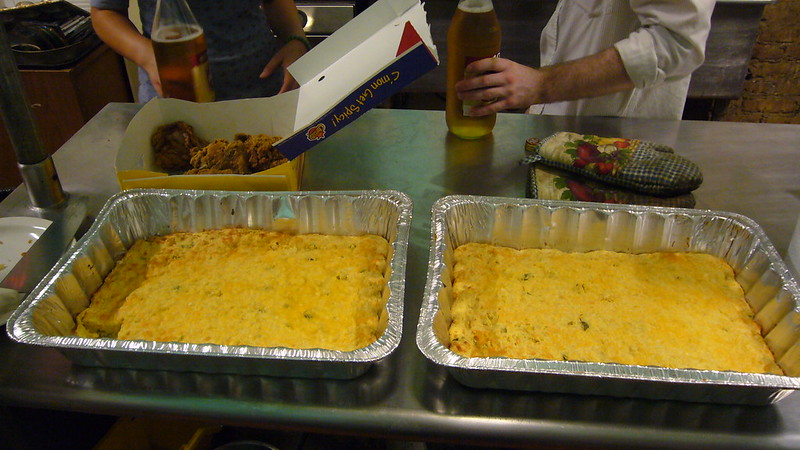Juneteenth
A Vibrant Celebration of Freedom and African American Culture
2026/06/18
Every June 19th, cities across America come alive with the soulful rhythms of jazz, the mouthwatering aroma of barbecue, and the vibrant colors of red, black, and green from the Pan-African flag as people gather to celebrate Juneteenth. Red symbolizes the blood shed and struggle under slavery, black represents African American pride and unity, and green symbolizes prosperity and hope after freedom. This federal holiday commemorates the emancipation of enslaved African Americans and has become a joyous celebration of freedom, resilience, and cultural heritage. From lively street parades in Galveston, Texas - the birthplace of Juneteenth - to community picnics in Philadelphia and educational events in Washington D.C., Juneteenth offers a unique opportunity to experience the richness of African American history and culture.
Main Attractions
Galveston's Historic Juneteenth Parade
In Galveston, Texas, where Juneteenth originated, the annual parade is a sight to behold. The streets burst with energy as elaborately decorated floats roll by, their designs paying homage to African American history and culture. The air fills with the sound of drums and brass instruments as marching bands perform rousing renditions of spirituals and jazz classics. Spectators line the streets, many dressed in vibrant African-inspired clothing, cheering and dancing to the music. The parade culminates at Ashton Villa, where a reenactment of the reading of General Order No. 3 - the document that announced freedom for all enslaved people in Texas - takes place, bringing history to life in a powerful and emotional moment.
Freedom Festival at the National Museum of African American History and Culture
In Washington D.C., the Smithsonian's National Museum of African American History and Culture hosts a grand Freedom Festival. Visitors can explore interactive exhibits that trace the journey from slavery to freedom, participate in storytelling sessions led by griot-style narrators, and attend lectures by renowned historians. The museum's grounds transform into a lively marketplace where artisans showcase traditional African American crafts, from intricate quilts to handmade jewelry. The air is filled with the enticing aroma of soul food as local chefs demonstrate cooking techniques passed down through generations.
Juneteenth Food and Heritage Festival
Food plays a central role in Juneteenth celebrations, and nowhere is this more evident than at the Juneteenth Food and Heritage Festival held in various cities. The festival grounds are a feast for the senses, with the smoky scent of barbecue mingling with the sweet aroma of freshly baked pies. Visitors can sample traditional dishes like red velvet cake, symbolizing the bloodshed of enslaved ancestors, and wash it down with refreshing red drinks like strawberry soda or hibiscus tea. Cooking demonstrations showcase the art of soul food preparation, while educational booths explain the historical significance of various dishes. The festival also features live music performances, ranging from gospel choirs to contemporary R&B artists, creating a joyous atmosphere that celebrates African American culinary traditions and musical heritage.
Cultural and Historical Background
Juneteenth traces its origins to June 19, 1865, when Union Army General Gordon Granger announced and enforced the Emancipation Proclamation in Galveston, Texas, freeing the last enslaved people in the United States. The newly freed people immediately began to celebrate their liberation, and this day became known as "Freedom Day."
For African Americans, Juneteenth holds more significance than just a historical commemoration. It is a symbol of freedom, resilience, and hope, and has become a day to celebrate African American cultural identity. The celebrations include various cultural events such as parades, festivals, and block parties. Public readings, singing, picnics, and church services are held, and in some states, rodeos, contests, and concerts are also organized.
Food culture is also an important element of Juneteenth. Barbecue is one of the most popular ways to spend time with family and friends. Many people also choose to shop at Black-owned businesses or dine at Black-owned restaurants on this day. This has become a way to support African American communities and promote their economic empowerment.
Juneteenth is also important as an opportunity to educate about African American history and culture. Many people learn about the history of slavery in America and the issues of racial discrimination that continued after emancipation through this day. With its official recognition as a federal holiday in 2021, Juneteenth has become a national opportunity to celebrate America's diversity and promote dialogue and understanding between races.
Participant Voices
As a history teacher, I decided to attend the Juneteenth celebrations in Washington D.C. The Freedom Festival at the National Museum of African American History and Culture was an incredible experience. I was particularly struck by a conversation I had with an elderly gentleman at one of the storytelling sessions. He shared his family's oral history, tracing their journey from enslavement to freedom. It was a powerful reminder of how recent this history is and how resilient our communities have been. I left with a wealth of new knowledge and perspectives to share with my students.
This was my first time attending a Juneteenth Food and Heritage Festival, and I'm already planning to come back next year. The variety and depth of flavors in the traditional dishes were mind-blowing. I had the most amazing conversation with a local chef about the history of soul food. She explained how many dishes were born out of necessity during times of slavery and have evolved into beloved comfort foods. Tasting her family's secret recipe for red velvet cake while listening to a gospel choir perform was a moment I'll never forget. It felt like I was experiencing a piece of living history.
Fun Facts
- Juneteenth is the oldest known celebration commemorating the ending of slavery in the United States, with its roots dating back to 1865.
- The color red is prominently featured in Juneteenth celebrations, symbolizing the bloodshed and resilience of enslaved ancestors. Traditional red foods and drinks are often served during the festivities. Strawberry soda pop is a popular Juneteenth tradition, dating back to the late 1800s when freed slaves would pool their money to buy the rare treat.
- The Juneteenth flag, designed in 1997 by Ben Haith, features a star in the middle, representing Texas, the Lone Star State, where Juneteenth originated.
- Opal Lee, known as the "Grandmother of Juneteenth," walked from her home in Fort Worth, Texas, to Washington, D.C., at the age of 89 to advocate for making Juneteenth a federal holiday.
Festival Dates
Juneteenth is celebrated annually on June 19th.
The event schedule is subject to change. Please check the official website for the most up-to-date information.
Media
Information
| Name | Juneteenth |
| Country | United States |
| Area | Texas, Galveston |
| Date | 2026/06/18 |
| Link |
Upcoming Festivals
Kukeri(Surva) Bulgaria
Bulgaria’s Festival of Spirits, Fire, and Bells That Drives Away Winter
2026/01/22Dinagyang Philippines
Iloilo’s Thunderous Festival of Faith, Tradition, and Dance
2026/01/22The Northern Lights Festival (Nordlysfestivalen) Norway
A Tromsø Miracle: Music and Aurora Dancing in the Arctic Night
2026/01/25Carnavales de Ituren y Zubieta Spain
Ancient Echoes and the Festival that Awakens Spring in the Basque Mountains
2026/01/26Up Helly Aa United Kingdom
A Night When Fire and Viking Pride Blaze in Shetland
2026/01/29Winterlude Canada
A Wonderland of Ice, Light, and Smiles in Canada’s Capital Region
2026/01/30Carnival of Viareggio (Carnevale de Viareggio) Italy
A Spectacular Parade of Giant Papier-Mâché Masterpieces
2026/01/30Fiesta de la Candelaria(Virgin of Candelaria) Peru
A Grand Dance Festival of Faith and Folklore Echoing on the Shores of Lake Titicaca
2026/01/31Thaipusam Malaysia
A Pilgrimage of Prayer and Penance Illuminates Batu Caves
2026/01/31Jaisalmer Desert Festival India
When Rajasthan’s Golden Dunes Dazzle with Color and Culture



